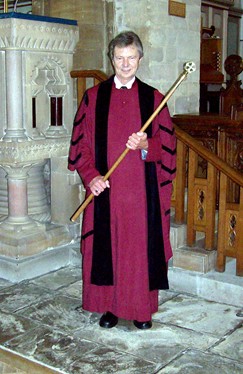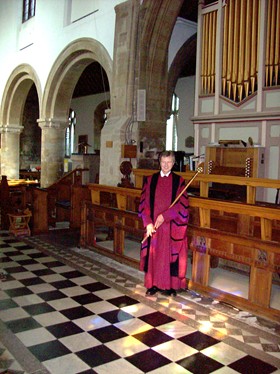The verger is that vital cog in the
parish church machinery that keeps the building and its services ticking
over with the minimum of fuss but without him, the efficiency that we come
to expect from a place of worship might not exist. The task at the Abbey Church in Bourne
was assigned for five years to Philip Pettitt, an unassuming man but whose quiet authority
was
responsible for the smooth running of this ancient place. In 1986, his career took a different path and he moved to the West Country where his interest in church work began and he was appointed assistant verger at Bath Abbey for two years before moving to Bourne and in 2003 he became verger at the Abbey Church. It was a job that Philip took very seriously, paying particular regard to his appearance at services, weddings and funerals, always conscientiously wearing a shirt and tie, black trousers, socks and shoes even beneath his burgundy robes. On 12th July 2006 he was officially admitted to the Church of England Guild of Vergers during a service at Lincoln Cathedral when his wife, Alison, also a dedicated church worker, was admitted as an associate member in recognition of her support as an invaluable helper. “Alison and I did not know what to expect from the service but we both found it simple, informal and extremely moving”, said Philip afterwards. He and Alison live in Pinewood Close and both devote much of their time to the Children’s Society, their fund raising including an annual late summer lunch in the church hall, usually for around 60 people with Alison cooking a three-course meal for the lot. They have been together for fifteen years but both have been married before and have children from their previous partnerships, Philip four and Alison two. The appointment of verger is voluntary although he did have a paid role in keeping the building clean but which he did not find onerous. “I love the Abbey Church”, he said, “and spend a lot of time here meeting people and talking with them about the various features of the building. It is a job I can never tire of because there is so much to see and to learn about the place.” Philip resigned as verger in September 2009 when he wrote an article for the parish magazine describing his experiences in office during the previous five years. "A verger should be unnoticed in his work", he wrote, "uuobtrusive and part of the furniture and even when dressed in cassock and gown during the ceremonial part, remind yourself that you are the verger and not a theatrical act but part of the worship." He went on: "The verger's duties are many, from unlocking the church, preparing for and taking part in the services and clearing up afterwards. Not to mention climbing those dusty and steep steps to the top of the tower to put up the flag on saints days. Visitors are always welcome, whether they be individuals on bikes just passing through the area, or relatives who have just come after thirty or forty years to see where they were baptised or even married. Coach parties of so-called specialists are a frightening breed. Archaeological societies, history groups, English Heritage and so on, they all seem to know more than I do, even when I am armed with my folder of all the historic notes I can get hold of. They always seem to want to argue about dates and styles of architecture.
"One visitor recently was a guide at Gloucester
Cathedral and he gave some useful advice: 'Just say that "it is understood
that" or "I read that so and so happened" and it worked wonders. Other
regular visitors are school groups ranging from toddlers to teens and on
these occasions I usually position myself at the font because they seem
fascinated by it and even climb all over it to look in. Usually, we talk
about their own baptism and what it means. They were last at the font when
they were either very small or even a baby. This, I found was a
significant way of teaching them and informing them about the actual
baptism ceremony. It was particularly lovely when the younger groups asked
me to baptise their dollies or teddies.
REVISED SEPTEMBER 2009 See also Christmas comes too early Return to The Abbey Church
Go to: Main Index Villages Index
|


